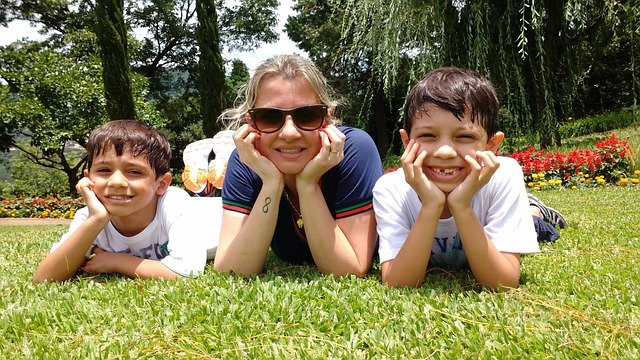|
Getting your Trinity Audio player ready...
|
Introduction
Ever wonder why certain families manage to flourish—even in the middle of modern life—while others hardly make it through the daily chores?
You’re not alone if you’re an American mom drowning in soccer drills, TikTok arguments, and the never-ending search to “do it all.” But supposing there was a method to parent with more ease, purpose, and delight without compromising your sanity?
Now enter Chelsea Acton, the revered parenting guru whose innovative method has made her well-known among American households.
In Chelsea Acton’s Famous Parenting Secrets: How to Build a Loving, Supportive, and Thriving Family, she offers the scientifically supported techniques that have won her praise from all around and a devoted following of parents that swear by her transforming techniques.
The well-known parenting approach of Chelsea is not based on rigorous regulations or Instagram-perfect moments. Rather, it’s a relevant, heart-centered route map meant for actual obstacles.
Drawing on over 15 years of coaching families, child development research, and her own path as a mother, she addresses the particular constraints today’s parents face: juggling job and family life, building emotional resilience in children, and creating real connection in a screen-dominated society.
Chelsea’s advice provides a lifeline whether your struggle is with bedtime meltdowns, negotiating teen drama, or simply a need for more laughing at the dinner table.
What therefore makes the parenting approach of Chelsea Acton so well-known and successful? Her ability to combine kindness with structure will help children feel safe, seen, and motivated to flourish in their homes. Inside her guide will be found:
- The #1 mistake, even among well-meaning parents (together with how to correct it free from guilt).
- How might empathy-driven communication help your children to develop unwavering confidence?
- Easy habits that, even on busy evenings, help to create the connection from anarchy.
- Why does her “calm leadership” approach help to build trust and ease power conflicts?
- Techniques to help children (while keeping your cool) negotiate obstacles, peer pressure, and strong emotions.
Perfect for parents who wish to reject the overwhelm and welcome what really counts, Chelsea Acton’s Famous Parenting Secrets is more than just a book; it’s a movement.
Join thousands of families who have turned their houses into growth, love, and support paradise. All set to enjoy the Chelsea Acton difference? Your flourishing family narrative begins here.
Why, based on science, parental wellness matters?
The APA cautions that long-term health problems like hypertension or anxiety as well as emotional tiredness and decreased patience might result from persistent parental stress.
Worse, children absorb parental stress, which can affect their emotional resilience and behavior. They are clever emotional sponges. Chelsea’s strategy is consistent with APA research: Families flourish when parents give their health top priority.
Consider it as a ripple effect: calm, grounded parents teach good coping mechanisms, build safe attachments, and provide a home where everyone feels safe to flourish.
Drawing on decades of experience, child psychology studies, and American Psychological Association (APA) insight, Chelsea’s parenting secrets are not about strict rules or Instagram-perfect moments.
Rather, they are useful, doable tools meant for actual families negotiating life. One deliberate step at a time, you will learn in Heart Warming Blog, how to build emotional resilience, increase trust, and establish a vibrant family culture.
Why Modern Parenting Feels So Hard (And How Chelsea Acton’s Secrets Can Help)
Rising rates of youngster anxiety, social pressure to “do it all,” and the erasure of work-life boundaries—all of which the APA notes present until unheard-of difficulties for today’s parents. Focusing on four pillars, Chelsea’s method directly addresses these issues:
- 1-Children flourish when they experience seen, heard, and valued emotional safety.
- 2-Intentional Communication: Words count—especially under trying circumstances.
- 3-Routines that fit your family’s particular rhythm can help you to have flexible structure.
- 4-Celebrating improvement rather than perfection is joyful growth.
1-Emotional Resilience Building for Children; The Chelsea Acton Way
Emotional resilience is, the APA emphasizes, the foundation of mental health. Chelsea’s techniques enable parents as well as children to negotiate strong emotions and recover from disappointments:
- Instruction in “Feeling First Aid”
- Say things like, “I notice your irritation.” Let’s name that emotion and work through a solution together.
- Normalize feelings: “Even grownups have occasional fear. How can one get brave?
Grow from Mistakes into Mastery
- Rather of “Don’t cry,” consider: “It’s okay to feel angry. From this, what might we pick up?
- Talk about your own challenges: “I also became anxious before my presentation today. I managed it like this.
Families Should Practice Gratitude
- Beginning meals with a “rose and thorn” routine, share one highlight and one challenge from the day.
- Make a “joy jar” in which everyone notes good events or little victories.
2- Positive Communication Parenting: Strategies for Speaking so Children Will Pay Attention
Famous for her parenting approach, Chelsea stresses connection above correction. Experiment with these APA-style ideas:
The three Cs of conflict-resolution
1-Calm: Lower yourself before responding. Share three deep breaths together.
2-Ask, “What were you hoping would happen?” instead of “Why did you do that?”
3-Cooperation: “Let’s tackle this hot issue. You have what ideas?”
Steer clear of these common traps
- Over-praising: Rather than “You’re very smart!” I saw how diligent you were on that project,”.
- Denying emotions: Replace “You’re fine!” With “That hurt, did it not? Allow me to check your knees.
- Tech Limiters That Support Relationship
- Create “unplugged zones,” such as bedrooms or the dining table.
- Model good behavior: “I’m shutting off my alerts so we might play board games.”
3-Creating Routines That Actually Work: Thriving Family Strategies
Messy mornings? Nightmarish bedtimes fight? Using Chelsea’s “flexible structure” approach, families can flourish free from rigidity:
The 20- Minute Restart Ritual
Before bed, spend ten minutes tidying and ten minutes connecting—that is, reading, conversing.
Weekly family meetings
Let children spearhead some of the agenda.
Celebrate successes: “Who wants to highlight a ‘proud moment’ from this week?”
Magic at Meals
- Turn “chef’s helper” duties to include children in cooking.
- Use open questions: “If you could create a holiday, what would it honor?”
4–Chelsea’s Discipline Secrets: Raising Kind, Independent Thinkers
The APA promotes discipline that teaches rather than punishes. Chelsea’s “calm leadership” style incorporates:
Natural Effects Against Penalties
Rather of “No TV because you didn’t clean your room,” try saying “We’ll have time for a show when your room is neat.”
The “Repair, Don’t React” Approach
Following a meltdown: “Let’s stop here. Both of us can discuss what happened when we are calm.
Give Children Choice
Would you want to study before or after a snack?
Should we repurpose or donate these vintage toys?”
5- Parenting is sometimes likened to oxygen masks on airplanes
You have to secure your own first before serving others. But many American parents put their well-being last in the rush of raising children, which results in exhaustion, resentment, and even souring of family ties.
Emphasizing that a strong family starts with loving parents, Chelsea Acton’s Family Wellness Guide turns this script around.
Inspired by American Psychological Association (APA) studies on caregiver stress and holistic wellness, this section is not only about bubble baths and “me time; it’s a science-backed road map to recharge your energy, build a support system, and reject the toxic myth of “perfect parenting.”
Strategies for Self-Care for Parents in Burnout
Chelsea’s motto? “Self-care isn’t selfish—it’s survival. Forget hour-long spa days—though those are nice!” Her advice is on micro-moments of rejuvenation that fit hectic schedules:
The Five-Minute Recharge
What Science Says: APA research reveals even short mindfulness exercises lower cortisol, the stress hormone.
Test This:
- Have tea in front of the sunrise—no phone permitted! List five things you see, four things you hear, and three things you feel in a “sensory reset.”
- Note three little victories: “Got the kids to school on time” counts!
The “Swap & Share” Tactic
- Negotiate childcare by teaming with another parent. For instance: “If you take mine Thursday, I will watch your kids Tuesday afternoon.”APA Insight: Social support guards against loneliness and stress.
Move Your Body—Your Method
- Making dinner, dancing to hip-hop from the 90s.
- Go for a ten-minute stroll; there are no step count targets; only fresh air.
- Exercise increases endorphins, so enhancing mood and concentration (APA-approved!).
Creating Your Support Village (because a tribe does take this into consideration)
The APA emphasizes how isolating parents increases their stress. Even in our highly individualistic society, Chelsea’s techniques enable you to create a village:
One should ask “Parent Allies.”
Participate in neighborhood events hosted by libraries, colleges, or programs like Peanut.
Pro Tip: Get close to common challenges. For instance: “Anyone else’s youngster fascinated by flushing toys down the toilet?
Share Without Guilt
- For weekend babysitting, hire a teenage neighbor.
- Get back time using grocery delivery services.
Chelsea says, “You’re not failing—you’re optimizing.”
Use Virtual Communities
- For instant advice, join Chelsea’s free Facebook group.
- Listen to podcasts advised by APA on parenting (Good Inside or Raising Good Humans).
Letting Go of ” Perfect” Parenting
The highlight reels on social media have changed our expectations. Based on APA studies indicating that children gain more from persistent affection than perfection, Chelsea exhorts parents to embrace “good enough” parenting.
One should start by View “Failure” as Feedback
- Said, for instance, during a meltdown? I apologize; I lost my calm. Allow me to try once more.
- APA Insight: Emotional intelligence teaches children modeling responsibility.
Avoid Comparative Culture
- Unfollow accounts that cause shame.
- Try writing a mantra: “My family’s journey is unique—and enough.”
Celebrate “Wins” That Count Most
- Did your children today experience love? Was the grocery store outburst survivable? Success is that.
- Chelsea’s advice is to make a “Win Jar” for notes like, “Made pancakes without burning them!
The lesson is little changes with great impact
Chelsea’s Family Wellness Guide doesn’t center on big gestures. It’s about including small acts of self-care, connection, and self-compassion into everyday living.
Parental well-being is not a luxury; rather, it is a need for producing strong, emotionally healthy children, as the APA notes. By giving your wellness top priority, you are not only surviving motherhood but also teaching your children lifetime lessons in how to establish limits, ask for help, and accept imperfection.
Start today by choosing one tip from above
Perhaps a 5-minute recharge or friend messaging to create a childcare swap. The aim is improvement rather than perfection.
Ultimately, as Chelsea notes,
“The best gift you can give your kids is a parent who’s totally present—not a perfect one.”
Real-Life Success Stories: Parenting Under Chelsea Acton Transforms Families
Nothing motivates change more than actual evidence. Embracing Chelsea Acton’s parenting techniques, these three families—The Johnsons, Single Dad Mike, and The Garcias—saw transforming outcomes.
Based on relevant hardships and scientifically supported techniques, their experiences demonstrate how little changes can lead to long-lasting relationships, less conflict, and transformation of daily problems into chances for personal development. Let’s start right now.
Success Story: The Johnsons: How did “Feeling First Aid” help to lower sibling conflicts by70%?
The Issue: Chaos in the House
Three children under ten (Liam, 9; Emma, 7; and Noah, 4) made the Johnson house a battlefield. Daily sibling rivalry erupted in front of screens—yelling over toys, tattling, and fistfights.
Parents Sarah and Mark, tired, turned to time-outs and privilege deprivation, but the cycle persisted. “We felt like referees rather than parents,” Sarah said.
Chelsea’s “Feeling First Aid” Framework offers the Solution
Inspired by APA study on emotional validation, Chelsea’s approach helped the Johnsons:
- Name emotions first: Rather than “Stop fighting! Say, “You both want the same toy, thus you’re both angry.” Let us sort this out together.
- Use a “Feelings Wheel” poster to help children recognize emotions (frustration, jealousy) and provide answers.
- Role-play situations: In quiet times, like breakfast, practice sharing and compromise.
The Result: harmony restored
The Johnsons changed dramatically within a few weeks. Emma shocked her parents one argument by declaring, “Liam’s mad because I took his LEGO.” Perhaps we could go in turns.
Battels fell by seventy percent by giving empathy top priority over punishment. “They still argue, but now they are learning to communicate—not just explode,” Sarah said.
Important lesson
‘’Emotions labeled help to disarm conflict. Children cannot “behave better” until they feel understood’’. —Chelsea Acton
Success Story: Reconnecting with a Rebellious Teen Using “Calm Leadership” Single Dad Mike
The issue is a broken relationship
Texas single parent Mike sensed his 14-year-old daughter Zoe sliding away. Zoe grew rebellious following the divorce of her parents, skipping classes, banging doors, and slipping out. Mike remarked, “I was either yelling or giving up.” “I considered myself to have lost her.”
The Method: Chelsea’s “Calm Leadership” Strategy
With Chelsea’s approach in line with APA recommendations on teen autonomy, Mike rebuilt confidence:
- Stop before responding: Mike waited gently till morning to talk about Zoe missing curfew.
- Work on limits: Together, they developed a “contract” for rights (such as phone use) connected to obligations.
- Give connection top priority; Mike introduced weekly “Dad-Zoe Time,” (hiking, baking)—no lectures permitted.
The Result: From Separated to Empowered
At first Zoe objected, but Mike’s consistency paid off. Mike said, “I’m here, no matter what.” Today, Zoe’s grades have improved and she texts Mike memes instead of slamming doors.
She opened up during one hike: “I was mad you and Mom split… I didn’t know how to say it.” “It’s not perfect, but right now we are a team,” Mike notes.
Main lesson
“Teens need boundaries; but, they will only respect them if they feel respected first.” — Chelsea Acton
Success Story: The Garcias; Using Creative Family Tech Challenges to Transform Screen Time Battles
Technology Tensions: The Issue
Maria, José, and children Sofia (12) and Diego (8)—the Garcia family—were caught in a screen time conflict. Weekends brought protracted negotiations: “Five more minutes!” vs. “You have spent hours on TikTok! Maria bemoaned, “We were either the ‘bad guys’ or letting screens babysit.”
The Fix: Chelsea’s “Tech as a Tool, Not a Threat” Approach
Chelsea pushed the Garcias to rethink screens via APA-supported group projects:
Family Technology Issues
- Perform a 60-second skit together. ( Winner chooses weekend dessert.)
- Let’s try a DIY scientific experiment found on YouTube!The (earned and shared screen time)
- 1:1 ratio: Spend thirty minutes on a family activity for every thirty minutes of alone screen time.
The result is screens meant to bond
First hurdle for the Garcias—a TikTok dance video—ended in laughs when José stumbled over the dog.
“We realized screens could connect us, not divide us,” Maria remarked.
Arguments about screen time fell by eighty percent, and Sofia even proposed unplugged game nights. “We are creators now, not only consumers,” Diego said.
Final Thoughts
“Technology is not the adversary here. Your family culture is defined by the way you apply it, Chelsea Acton
The Significance of These Stories
These families embraced Chelsea’s basic ideas—empathy, teamwork, and intentionality—which changed their family relationships rather than merely “fixing” issues.
As the APA stresses, permanent transformation begins with little, daily acts. Chelsea’s techniques—which range from acknowledging emotions to leading with calm to redefining technology—work because they are anchored in connection rather than control.
Your Turn:
- Starting with one story-inspired advice, suggest a family tech challenge this weekend or try “Feeling First Aid” amid sibling arguments.
- Recall: Perfect is not what progress is. As Chelsea notes, “Every little step toward connection is a victory.”
Ultimately, the legacy of love your family left begins now.
Parenting is about coming up daily with the bravery to love imperfectly and the belief that little events of connection may rewrite the narrative of your family, not about trying to get it “right.”
The laundry will build up, calendars will overflow, some days may leave you breathless—but here’s the secret Chelsea Acton wants you to know:
You are enough. Every time you stoop to listen instead of talk, every time you choose inquiry over criticism, every time you laugh through the turmoil, you are creating a legacy of love your children will inherit.
Neither the Johnsons, Mike, nor the Garcias changed over night. They began with one honest discussion, one long breath, one small step toward confidence. You can also.
Five years from now, your house will be where your children know they are loved just as they are, where mistakes become teachings, and where happiness is not a luxury—rather, your family’s pulse.
Decide on one thing today. Perhaps it’s a five-minute “gratitude snack” whereby everyone reports a success. Perhaps it is murmuring, “I’m here, no matter what,” as hostilities develop.
Alternatively it could be at last forgiving yourself for those days you “lost it” and resolved to try once again.
About ready to delve further? Using Chelsea’s Parenting Secrets book or free workshop, “From Surviving to Thriving: Reclaim Joy in Your Family Journey,” join thousands of parents rewriting their family stories.
Your children won’t remember a perfect house or set of rules. They will recall how you created seen, safe, and fiercely loved feelings for them. Now start to create those memories.














